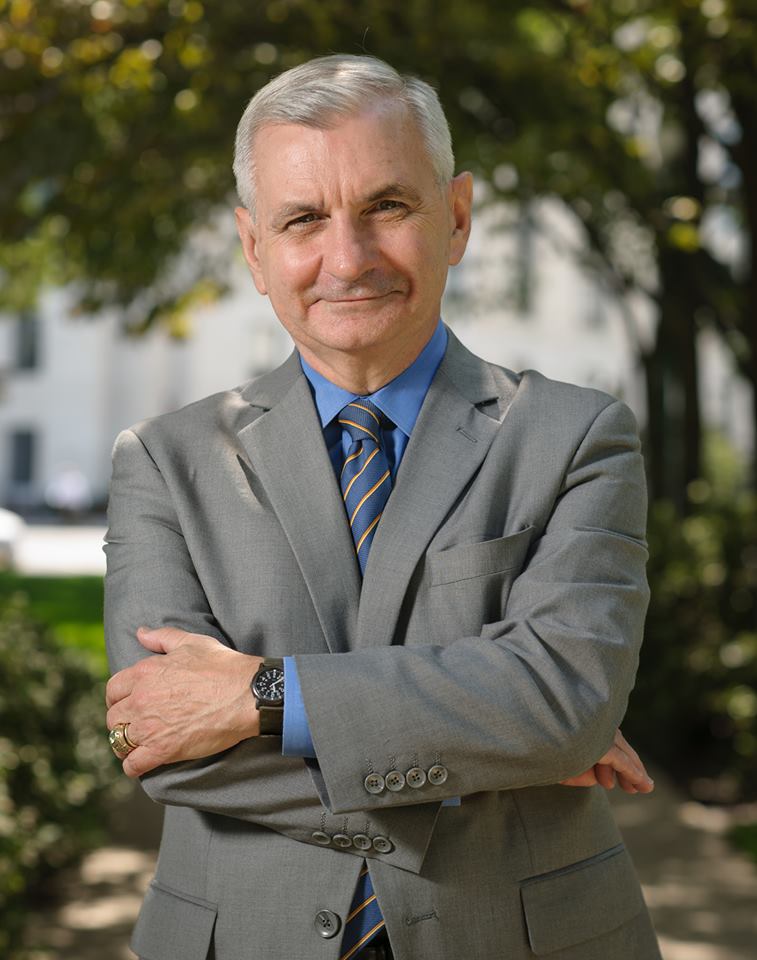Jack Reed (D-RI) is the senior United States Senator from Rhode Island. A decorated veteran, Reed has served in the Senate since 1997. He is the ranking Democrat on the Senate Committee on Armed Services and a member of the Senate Appropriations and Senate Banking, Housing, and Urban Affairs Committees.
You’ve called climate change one of the most important issues facing the United States. What do you think is the best route toward mitigating climate change?
First, recognizing it is a problem, and there are some people that don’t. Then, we have to be very shrewd, in terms of how we approach it. There are some obvious things that we can do. One is demand reduction for hydrocarbons in the United States, weatherization programs, alternate energy programs…Then, we have to work on an international basis, because this is not a strictly local problem. It is a huge international challenge. [We should also] discuss using the pricing system, in terms of carbon taxes and other aspects, so that we really incentivize people to pick wise, long-term choices in terms of energy use.
Another issue you’ve dedicated a lot of attention to is college affordability. What would you do to help address the rising cost of college?
We really need to make college affordable again. And it’s not just an education issue — it’s an economic issue. For a generation of students leaving college with so much debt, it inhibits their ability to buy homes, to take jobs, and we have to change that. So I’ve been working closely with colleagues like [Senators] Dick Durbin (D-IL) and Elizabeth Warren (D-MA) to try to to change the way we support college education…to have institutions put a little skin in the game. For a lot of higher education institutions, their business model is basically to get as many people with as much financial aid as [they] can. And then if they get a good education and job, that’s nice — [the college has] the money. That’s not the way to proceed. So we’ve actually suggested in legislation that if your default rate reaches a certain level, then the institution is responsible for some of the debt, not just the government. That’s the way — again using market mechanisms, using incentives — to do the right thing. It is a smart, efficient way to get it done.
Are there other ways the United States education system can adapt to shifting economic tides?
I’d start with Pre-K — start with programs that try to enhance the education of children very early before formal schools. And then, I think we need to come to grips with what is the best way to reform elementary education…Mentoring teachers, providing them support, providing them with enrichment activities to make them better teachers — that’s something we have to do. We also have to be interested in parental involvement…You can’t just wish for that. You have to have proactive activities to do that.
What proactive policies would you implement?
One is to recognize very explicitly that principals, for example, should be educational leaders in schools…They should be encouraged to be in the classroom on a regular basis evaluating teachers. Their role [is] not just administrative…they’re really educational leaders…mentoring teachers [and] developing the best teachers. That is not only a shift in terms of perspective…it’s also giving them the resources and the time to do it…In practice, it’s having a somewhat gifted educational leader there everyday to call upon, indeed, to have them come in and say, “Look, I saw your class, and you can do better. Let me show you practically how to do this”…I think most people want to do the best job they can. It’s not a question of, “I have a job. I don’t care.” No, it’s “I want to do my best job. Show me how I can do it.”
In light of recent events at Brown, University of Missouri, and Yale, you’ve called for young people to engage in dialogue with police and other community leaders. What do you think the government’s role should be in creating that dialogue?
It’s got to be everybody. It’s got to be people reaching out. And it’s not just the government — you know, the faith community plays a big role. Civic, not-for-profit groups play a big role. We’re looking around when you’re talking about the relationship between law enforcement and the community. People are engaged. We’ve got a faith community that is involved that is collaborating with and involved in these issues. One advantage with Rhode Island: It’s a small community; we know each other. That, sometimes, is helpful and sometimes it’s not. In this case — again I can’t emphasize this enough — it’s just my perception that where there’s dialogue, there’s usually an appreciation by both sides of the difficulties, the challenges, etc. When there’s no dialogue, that’s when one incident can trigger a whole reaction, because both sides completely misunderstand each other.
Do you ever think that your longevity in Congress may be a negative? Do you ever think of stepping down to make room for a newer, fresher face?
I think you learn more each day if you continue to be aware and to not assume you know everything but try to ask questions and answer questions and think through different problems. And among my colleagues, I’ve seen a growing awareness of the complexity of problems…I’ve been through multiple reauthorizations of the higher education legislation, for example, so I’ve seen ideas that have been front and center, and then some have worked and some haven’t. I’ve been through the financial crisis and through the tough votes on policy in the Middle East in terms of both operations Desert Storm and Iraqi Freedom. So there is a certain balance of experience as well as knowledge. And I think everyone has to ask themselves, “Am I doing my best? Am I doing what I can?” I hope I am.
